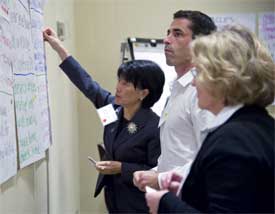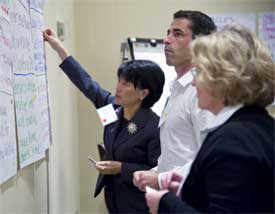 KINGSTON, R.I. –February 1, 2012–The idea of an engineer working alone on a widget in a cubicle is a thing of the past, according to Thomas Wroe, the CEO of Sensata, a global industrial technology company that develops, manufactures, and sells sensors and controls. The company employs about 12,000 people in 11 countries, including 750 people at its U.S. headquarters in nearby Attleboro, Mass.
KINGSTON, R.I. –February 1, 2012–The idea of an engineer working alone on a widget in a cubicle is a thing of the past, according to Thomas Wroe, the CEO of Sensata, a global industrial technology company that develops, manufactures, and sells sensors and controls. The company employs about 12,000 people in 11 countries, including 750 people at its U.S. headquarters in nearby Attleboro, Mass.
Wroe argues that today’s Sensata’s engineers must be technically competent, but also culturally intelligent since 60 percent of the company’s income comes from Europe and Asia. In short, his employees must be citizens of the world. But Sensata was unable to find 70 such citizens last year, thereby leaving the company with that many positions unfilled.
Wroe, a 1972 University of Rhode Island engineering alumnus, made his remarks at the 2011 Rhode Island Language Summit: Roadmap to Language Excellence, held in Providence in December. Hosted by URI, the summit was sponsored by the Language Flagship, a federal initiative of the National Security Education Program. It brought together leaders from business, government agencies, and non-profits for a full-day working session to strategize how to meet the global and domestic needs for foreign language speakers. Similar roadmaps have been produced in Oregon, Ohio, Texas, and Utah.
During the summit, working groups were formed, and are currently meeting to design approaches to meet those needs with policies and educational strategies. A draft will be submitted to the federal government by mid-April, with the final version to be presented to the public by May 31.
Prior to the meeting, a research team, coordinated by the URI Chinese Flagship Program, provided results from a comprehensive study of the supply and demand for foreign language speakers in Rhode Island. Among its findings:
 * The state’s K-12 education system does not require students to pass a foreign language proficiency test, and in most districts students are not required to take a foreign language to graduate from high school.
* The state’s K-12 education system does not require students to pass a foreign language proficiency test, and in most districts students are not required to take a foreign language to graduate from high school.
* More than 20 percent of the state’s population speaks a language other than English at home, primarily Spanish, but also Khmer (Cambodian,) Vietnamese and Haitian. But employers can seldom find police, fire, or health department employees, or emergency room doctors or nurses who speak Spanish. Nor can they find social service workers who speak Khmer. Instead employers are forced to look for them elsewhere.
* Rhode Island companies indicate that Spanish, Chinese, German, and French are needed for current global operations and place Chinese, Brazilian Portuguese, and Arabic as most prominent for future language needs.
* Seat time, the hours logged learning a language in a classroom, is not enough. Employers look for employees that possess high levels of language proficiency and cultural skills.
In the study, Melissa Long of the Rhode Island Department of Transportation recounted that the department recently conducted a bridge renovation in Providence. The department developed outreach materials, including mailed notices but only in English. However, the bridge project affected traffic flow and accessibility to a largely Spanish-speaking neighborhood. The department was forced to scramble and sent contractors and employees door-to-door to notify the residents that work on the bridge was about to begin. Long noted that if the agency had access to Spanish-speaking employees with good writing and speaking skills, last minute canvassing and the added expense it incurred could have been avoided.
Andrew Corsini, CEO of Supfina, a metal super-finishing company in North Kingstown, noted the company’s exports now make up 60 percent of its business. “There are extra business costs for not having linguistic and cultural skills readily available. When we are not able to ask the right questions to find out what the customer’s specific needs are, this costs us money.”
“Bi-lingual speakers are the rule, not the exception in most places in the world,” says J. Andrés Ramirez, assistant professor of educational studies and coordinator of the English as a Second Language Intensive Program at Rhode Island College. “We seem to be fighting this global logic here. Monolingual English speakers tend to believe that speaking only English is sufficient and not a big disadvantage. After all, English is widely used in the world. This belief has created the idea that they don’t have to accommodate other language speakers, but that these foreign speakers must accommodate them. It has become pretty clear in this summit that such an assumption is out of place in the current predominant U.S. service economy.”
URI Department of Communications & Marketing photos by Michael Salerno Photography.

